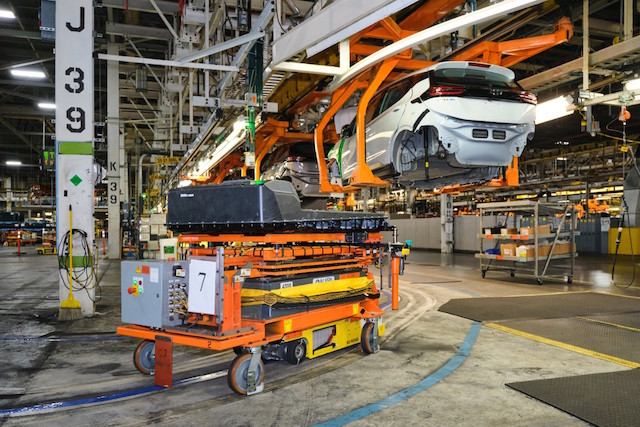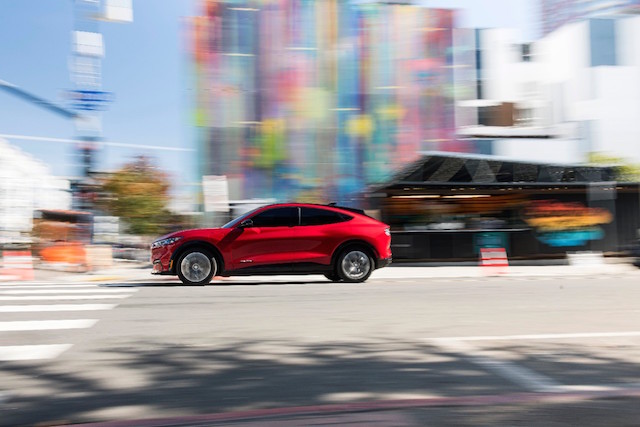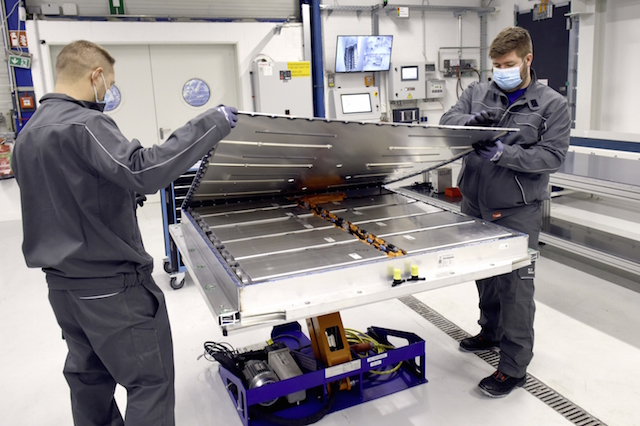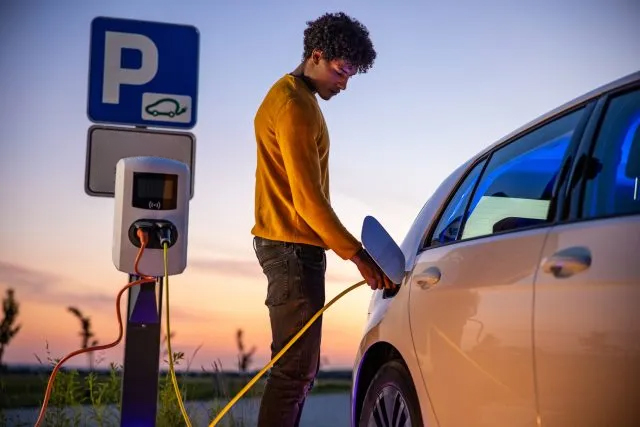Few would argue electric vehicles aren’t without their faults – they’re often expensive, take time to charge, etc. Their positive effect on the environment, however, is rarely brought into question.
The presence of an electric-powered battery instead of an internal combustion engine allows these cars to roam the roadways without producing any harmful tailpipe emissions. But between manufacturing, charging and recycling them, these batteries may not be as green as they seem. It begs the question: Are electric car batteries bad for the environment?
Let’s follow an electric car battery through its life cycle to see where it’s helping the environment and where it’s not.

Raw Materials
The environmental toll of electric car batteries begins before the product is even assembled, most notably in the mining of its active material, lithium. To extract lithium from the earth, an immense amount of water is pumped down into salt flats, bringing mineral-rich saltwater to the surface. Lithium is filtered out of the mixture left behind after the water evaporates.
This water-intensive process is problematic for several reasons, including its potential to contaminate the water supply. Further complicating the issue is the location of these mines, many of which are found in desert regions of Australia and China. More than half the planet’s lithium supply, however, is in an area called the Lithium Triangle, spanning Andean Mountain sections of Argentina, Bolivia and Chile. The area is one of the driest places on the globe, and lithium mining consumes as much as 65% of the region’s water, according to the United Nations.
Lithium isn’t the only potentially hazardous electric vehicle battery material. The process of mining for cobalt, the majority of which is done in the Democratic Republic of Congo, produces hazardous byproducts that can toxify the environment. Cobalt mine sites often contain sulfur, which generate sulfuric acid when exposed to air and water. This process wreaks havoc on rivers, streams and aquatic life, creating damage that can last for hundreds of years, according to the United Nations.

Production
Because of methods required to mine for its raw materials, and their subsequent environmental effects, battery production is likely the most environmentally damaging stage in the manufacturing of electric vehicles. Research by the International Council on Clean Transportation (ICCT) found battery manufacturing to account for 15% to 20% of an EV’s lifecycle emissions.
If you remove the lithium battery from the equation, production of electric- and gas-powered vehicles is very similar and thus, have nearly identical effects on the environment. Its inclusion, however, makes electric vehicle manufacturing slightly less environmentally friendly than that of gas-powered vehicles.

In-Use
Critics of electric vehicles are often quick to point out that green vehicles aren’t, in fact, green. They are charged by an electrical grid likely powered by fossil fuels. This is true. Unless the electricity utilized to power an electric car battery is derived entirely from renewable energy, there are emissions associated with it.
But electric grids across the country are shifting to a mix of natural gas, wind and solar power. Currently, nearly 20% of the electricity in the country is powered by renewable energy, according to the United States Environmental Protection Agency. (Close to home, nearly 17% of New England’s electrical grid and more than 40% of upstate New York’s is fueled by renewable sources.) Regardless of where you live, you’re likely getting at least some of your power from green energy.
Even accounting for electricity emissions, however, research shows that an electric vehicle is typically responsible for lower levels of greenhouse gases than an average new gasoline car due to the complete absence of tailpipe emissions over the entirety of the car’s lifespan. Gas-powered cars, as we know, are another story. The EPA has continuously found the country’s transportation sector to be the largest contributor of greenhouse gas emissions, with cars and trucks leading the way within the category.

Recycling
Electric and internal-combustion vehicles have drastically different environmental effects when the cars are in use. But when it comes to recycling, the situation is completely reversed. As little as 5% of the world’s lithium batteries are recycled, according to the American Chemical Society, a stark contrast to the 99% of lead car batteries recycled here in the U.S.
The dearth of recycled lithium batteries has significant economic repercussions, but it also takes a dire toll on the environment. Most lithium batteries end up in landfills, where their hazardous components can leak into the soil and groundwater. Landfills are also a major contributor of greenhouse gas emissions, the EPA reports. Recycling would also limit the need for mining raw materials, an environmentally destructive stage in an electric car battery’s lifespan.
So why are so few lithium car batteries recycled? In short, because it takes a lot of time, money and effort. Unlike lead batteries, there’s no standardization when it comes to lithium car batteries. They often vary in size, shape and component ratios from one manufacturer to another. Each one, therefore, needs to be broken down in a different manner, creating a highly labor- and energy-intensive process. Making matters worse, battery packs are not designed to be disassembled. They can contain several thousand individual battery cells plus a complex system of circuitry and sensors. All of these components are tightly packed together and secured in a plastic or aluminum case.
Like other aspects of electric vehicles, lithium battery recycling finds itself stuck in a chicken-and-egg problem. Because of the hurdles, governments and private companies have been hesitant to invest in large-scale recycling programs, but improving recycling efficiency won’t occur without such efforts. We are beginning to see some changes, however. In 2019, the Department of Energy announced the creation of the ReCell Center, the government’s first lithium battery recycling research center, dedicated to developing a cost-effective, environmentally sound recycling process that “will help enable the United States to compete in a global recycling industry and also reduce our reliance on foreign sources of battery materials.”
In Conclusion: Are Electric Car Batteries Bad for the Environment?
Environmentally speaking, electric vehicle batteries are far from perfect: assembling them depletes the Earth of its natural resources; manufacturing them is energy intensive; charging them requires dirty energy; and recycling them is nearly impossible.
These negative effects, however, are offset by the absence of tailpipe emissions throughout the vehicle’s lifetime. the aforementioned ICCT study found electric vehicles in the U.S. produce 60%-68% fewer emissions over their lifetime than gas-powered cars.
So, in short, electric vehicles are the more climate-friendly choice. That said, there’s room for improvement. More efficient manufacturing methods, greener electric grids and improved recycling options would benefit electric car batteries – and the environment – going forward.
Visit AAA’s Electric Vehicle platform for more information on these cars of the future.
66 Thoughts on “Are Electric Car Batteries Bad for the Environment?”
Leave A Comment
Comments are subject to moderation and may or may not be published at the editor’s discretion. Only comments that are relevant to the article and add value to the Your AAA community will be considered. Comments may be edited for clarity and length.


















There are now a number of car battery recycling companies in the USA in 2023. All metals from them are being used.
Battery types are also changing. Very soon Sodium ion batteries will be in EV’s…if you want to know how safe they are, look them up. Things in the EV world are changing every day….
Stackable Integrated Battery’s most popular products in Europe in 2023
http://www.essvalley.com/stackable-integrated-battery
[…] as cobalt and lithium. These metals have to be mined out of the earth through processes that are anything but green. In fact, mining the materials for an EV battery and assembling it produces more emissions than the […]
Based on articles that I have read, the life of a lithium car battery is approximately 10 years and the cost to replace the battery can be north of $10,000. I usually keep my cars until the cost to maintain them becomes prohibitive and therefore, the age of my vehicles usually reaches 14 to 20 years. If I were to own an electric car, a $10,000 repair bill would be prohibitive and therefore I would be forced to junk a perfectly good (except for the battery) 10 year old vehicle. In addition the used car market would be negatively affected, since very few people would buy a used vehicle older than 6 or seven years knowing that a few years down the road they would have a $10,000 plus repair bill.
The Li supply is limited. On a major expanse of the technology to power a large percentage of public mobility will easily deplete all the easy reserves of Li. For a long term renewability panacea batteries will fail miserably. The only energy source that will save planet earth for as long as the sun runs is green hydrogen and bio fuels.
Potential for massive amounts of Lithium, cadmium, and cobalt invading ground water sounds more destructive than greenhouse gases.
This article and the article it cited mention over and over the lack of recycling of batteries. But then later it mentions car batteries but the source article it came from wasn’t about car batteries, it was about all batteries and the overwhelming majority of lithium batteries come from cell phones. And of course cell phone batteries are rarely recycled – BECAUSE THEY ARE TINY!. This can fudge up the numbers when you are simply talking about the large number of batteries that are not recycled.
So this article doesn’t really definitively discuss the much larger and thus easier to recycle lithium batteries which according to the industry, they are recycling more and more and more.
Now I’ve long seen AAA as an automobile lobby and has shown that they are anti mass transit. That makes sense considering their source of income. But to be anti EV and pro fossil fuel?
Certainly seems so from this article.
The Lithium Ion battery is not the last battery on earth, and should be replaced shortly by the carbon nanotube capacitor (“Hairy capacitor”) in its last stage of development for vehicle use. It charges almost instantly, does not depend on Lithium mining but on carbon, using one of a few manufacturing processes. Recycling carbon is not a thing! No doubt we need to figure out electrical storage so as not to need generating stations running energy into the ground when not used, which these Nanotube capacitors can also handle in macro formats.
Refreshing to be reporting the truth some people like to keep there head in the sand and listen to one side usually there’s , but anything that produces energy is a polluter in some way
Not mentioned at all is the fact that EV batteries do not last the life of the car. What happens to the analysis if battery replacements are included. When looking into solar power for my house I learned that the battery life is only 5 years. Another factor to be considered…
we need to get cars to run on natural gas. Its a natural resource as well as cheaper. If people dont care about the environment theyll care about the cost. However, if the switch is made, the cars must be assembled correctly because natural gas is very flammable. But, would increase the environment rather than admitting more green house gasses
What about natural gas powered vehicles? We could have natural gas or LNG stations just like you can do when you fill up your tank for your grill. What I saw in the article is, that natural gas powered energy plants are better for the environment. You don’t have to worry about emissions from using your gas grill to barbecue.
Please consider that when you drive to the store, you start your car, you start utilizing fuel and when you stop at the store, you stop utilizing fuel. When power plants produce power (including that required for EVs), they have to produce enough to support the potential demand. The power difference between that potential produced by the electric companies and that actually used, is wasted and goes right back to mother earth. Not as efficient as the start and stop of the individual IC engine. Also, is running all that electricity in the ground contributing to weather changes?
The comment “When power plants produce power (including that required for EVs), they have to produce enough to support the potential demand.” is misleading and/or wrong. Power plants produce enough power to support current demand. The entire system is designed to be able to meet “potential demand” but the electricity system operator operates the system such that power produced meets the current demand. So there is no difference of energy to deal with that is wasted. In the future as energy storage on the grid becomes commonplace excess capacity could actually be used and then a deliberate amount of energy could be produced in excess of what is currently demanded that could then be stored for use at a later time. The electric vehicle is much more efficient that the start and stop of the individual IC engine. Electric motors are much more efficient than IC engines in a vehicle. IC engines are rarely operating anywhere near their peak efficiency during a trip driving to the store. This is one of the significant advantages of electric vehicles as the electric motors are able to operate near their peak efficiency over a wide range of speeds and loads such that they are much more efficient than a IC vehicle and this would be even greater when compared to a short trip to the store or when driving in stop and go city traffic. The comment “is running all that electricity in the ground contributing to weather changes?” is nonsensical.
“Apples to apples, electric cars are far more efficient than their gas-powered brethren. Efficiency here being measured by the fraction of energy used to propel the vehicle compared to the amount of energy produced by burning of fuel. Due to the sometimes pesky laws of thermodynamics, gasoline engines offer efficiency ratings of only about 15%. This means that most of the energy generated during combustion is lost to the environment. Electric cars can offer efficiencies around 70%, although this amount can vary based on the vehicle and the driving speed.”
Excellent article on the downside of electric vehicles. Well Done!
This article contradicts itself and leaves out vital information.
While it states that the extraction of lithium and other necessary minerals uses large amounts of water it does no say how that water is pumped and what is suesd to fuel those pumps (fossil fuels?).
You ask a valid question regarding the pumping of huge volumes of water and as mentioned it becomes contaminated as well. Regardless of the power source to pump it, it eventually comes back to fossil fuel for generation. But you know that the production of EV’s is a top priority for all the climate alarmists so to hell with the people of the Congo as their rivers streams and lakes become contaminated and the water supply is depleted. These people and their country will be exploited and taken advantage of, so the racial overtones will be quietly and quickly swept under the rug by all the global elitists. Alternative power sources such as hydrogen as mentioned by one commenter, should have been more fully explored before going whole hog into the EV production/business. After all water is a premiere source of hydrogen (H2O) so filling your tank with water would be awesome.
Can’t say it much better than that. I agree with Jim.
Whole heartedly agree Jim, GOOD VALID points !